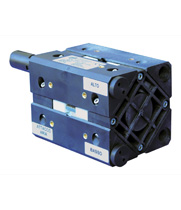PRODUCTS
Cubic series air-operated diaphragm pumps

Introduction
Cubic mini diaphragm pumps are characterized by exceptional performance, power and strength, making them ideal for pumping liquids with high apparent viscosity even if containing suspended solids.
The stall-prevention pneumatic system assures a safe pump running and it does not need lubricated air.
Self-priming dry capacity even with considerable suction head, fine tuning of speed without pressure loss and the possibility of dry operation without suffering damage mean that these pumps offer unrivalled versatility.
In addition, the huge choice of construction materials allows selection of optimum chemical compatibility with the fluid and/or environment without neglecting the temperature range.
They are specifically designed for demanding applications with high humidity or in potentially explosive atmospheres (ATEX certification).
Main features
– available in PP, PVDF/ECTFE;
– use in potentially-explosive atmospheres (ATEX zone 1-2 certification)
– suitable for demanding applications and high-humidity environments;
– dry operation;
– dry self-priming;
– actuated using non-lubricated air;
– stall-prevention pneumatic circuit;
– adjustable flow rate and head;
– fine tuning of motor speed at constant pressure;
– twin-manifold option (two suction and two delivery);
– bench or ceiling installation;
– three suction and delivery positions;
– user-friendly maintenance and parts replacement;
– excellent performance and value for money.
How it works
Diaphragm pumps consist of a stall-prevention centrally-housed pneumatic exchangers.
The new generation diaphragms (Long Life profile) are fitted to its shaft.
At the two ends, the two pump casings house the ball valves and seats of the product suction and delivery duct.
The compressed air introduced by the pneumatic exchanger behind one of the two diaphragms generates compression and pushes the product into the delivery duct, at the same time the opposing diaphragm that is integral with the exchanger shaft creates a vacuum and intakes the fluid.
Once the stroke has been completed, the pneumatic exchanger diverts the compressed air behind the opposing diaphragm and the cycle is reversed.
Installation
Diaphragm pumps should be bolted horizontally to the feet or provided holes.
Installations:
– drum transfer (with max. viscosity 10000 cps at 20° C)
– self-priming (with max. viscosity 10000 cps at 20° C)
– under head (with max. viscosity 50000 cps at 20° C)
– immersed (with max. viscosity 50000 cps at 20° C)
– twin suction and delivery manifold (with max. viscosity 50000 cps at 20° C)
– twin delivery manifold (with max. viscosity 50000 cps at 20° C)








